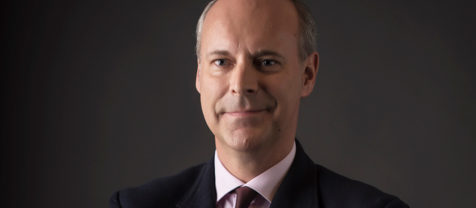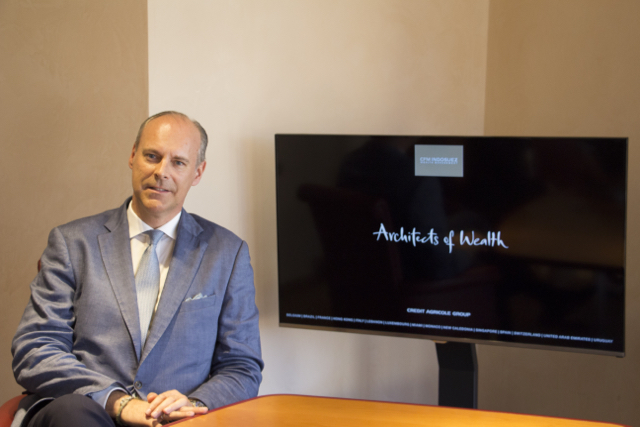
As Global Head of Foreign Exchange and Precious Metals Advisory Indosuez Wealth Management, Davis Hall, leads a global team of 28 – including three in Monaco – strategically placed Forex specialists who speak directly to the Group’s largest customers who are multi-currency exposed.
Before joining Indosuez Wealth Management in Switzerland in 1992 as a manager, Mr Hall, who was in Monaco last week to address clients of CFM Indosuez Wealth Management, started his banking career six years prior with Chase Manhattan Bank in Geneva as a trainee in the capital markets division. He then joined Cargill’s financial markets division, where he became head of the FX Proprietary Trading team.
“When I joined Indosuez Wealth Management 25 years ago, I was hired to assist the set up of a fully fledged advisory foreign exchange service as a complement to the wealth managers. I still believe that currencies are a stand-alone asset class, more than ever before, with $5 trillion daily turnover. It’s the most liquid market in the world and it never sleeps,” said Mr Hall, adding that’s what makes it the “perfect discounting machine where investors can immediately reflect their convictions through the deep liquidity of the markets.”
Mr Hall, who holds a BA in Languages and Fine Arts from Bowdoin College in Maine, relayed that currencies have never before been so immediate in their responses to geopolitical events, and while he believes there’s an end in sight to this period of massive political uncertainty, still every week we see something new. He used Donald Trump’s unpredictability as an example, pointing towards last week’s action in Syria, which he said adds to market hesitation as fear levels and risk aversion increase.
“Even our long-standing customers are starting to have a shorter and shorter investment time frame, as we have a market that is driven by such unpredictability.”
And no one knows what the end game will be, including Mr Hall and his department, who view the preservation of clients’ wealth as “how to best preserve investors’ fortunes given this very short-term focus and desperate search for yield and return”.
“Bonds, which are at record price levels, have been going up for 75 years if you look at long-term charts. We have interest rates and yields that have never been this low. We have accommodative monetary policy that has never been tested before, so this is a new unorthodox experiment. This is where currencies are so fascinating,” Mr Hall, who received an international baccalaureate from the International School of Geneva, enthused.
“Things are going to become very exciting in the next couple of weeks with the focus on France and the outcome of the elections, which could be asymmetrical for the euro.”
Euro: can the markets adjust?
Commenting that these days you need to be more of a psychologist than an economist as the fundamentals have been trumped by politics, Mr Hall explained the euro in a very binary way. “The euro has been falling for eight and a half years. At the moment, the market on the euro is still 1.07, essentially the same as last year and the year before that. But the Fed is raising rates, and the dollar is no longer responding by going up against the euro, which indicates that the euro is being held down largely because of politics, whereas in reality the fundamentals in Europe are getting better and very much on the mend.
“For the first time since 2008, the 4th Quarter growth in the EU was better than US growth. You no longer have a noticeable delta of inferior growth, which was previously a driver for currencies. We know the euro is cheap and far below its equilibrium purchasing parity level, which is estimated at 1.23. However, it can’t go up until Europe stops inflating its balance sheet with an accommodative monetary policy and buying all the bonds it can to keep yields down while maintaining negative short-term interest rates.
“Germany doesn’t require the monetary policy that’s being set primarily for the weaker nations. Europe won’t be able to normalise its monetary policy before the third quarter of this year. We have still to get through the German elections, so on balance I believe the euro will bend but ultimately not break. To make money at this juncture you need to be somewhat counterintuitive. I believe it is dangerous to sell euros at below 1.05.”
Stating that many of Indosuez Wealth Management’s customers are euro based, the euro-dollar is always a reflection point on both sides of the Atlantic. “The US equity market rallied up 15% since Donald Trump was elected, and with things being so politically uncertain in Europe, one would assume it’s a one-way bet and the dollar should just go up. Yet Janet Yellen, Chair of the US Federal Reserve, raised interest rates and the dollar went down. Gold, however, started to go up.
“The view we share with customers is that when things become this unpredictable, you have to tweak your portfolio accordingly. Given that everyone is looking for yield to extract revenue from their hard earned savings, you still have to take a relatively high degree of risk but you also have to include a couple of shock absorbers in the portfolio. We have been suggesting gold for a while now as a viable hedge. After all, nothing clears the mind more than the absence of alternatives. It’s very cheap insurance and as we believe that inflation is returning, slowly but surely, and that accommodative monetary policy will be gradually taken away, markets are going to have to adjust.”
Mr Hall, who developed strengths such as a sense of discipline as well as risk-taking during his four years at Cargill, said that those wishing to maintain exposure should probably look at some sort of portfolio alterations that will compensate in case volatility increases. “Volatility may only increase for the next couple of weeks if we can get beyond May 8th in France without an extreme left or right candidate victory, then we might be able to revert back to a focus on fundamentals, instead of politics.”
Europe has “been overly attentive to politics and Brexit”, Mr Hall commented, while pointing out that growth improvement, falling unemployment and the massive current account surplus that Europe – not just Germany – is running is not being talked about. “France is almost back to a balanced trade account. Spain has a current account surplus. These are not getting to the front page of the news, but they should once the euro no longer falls.”
Sterling: Impact of Brexit
The pound was at 1.50 and has fallen some 18 percent in 18 months, so it has already priced in all sorts of negatives. There’s a likely, albeit short-lived, recession coming; London will be less and less attractive. Sales forces of distribution and financial services could well be relocating away from the city of London, which means a lot of high earners could leave, and the UK could well be faced with a balance of payments problem longer term.
“The UK imports 50 percent of their food and energy in a currency that is 20-25 percent more expensive. They export 50 percent to the EU, but the EU only exports 9 percent to the UK. So the UK has so much more to lose with Prime Minister Theresa May in a tricky position.
Mr Hall believes that the pound will continue to underperform other currencies. The UK is likely to suffer from stagflation – “the worst enemy of any central banker” – and if interest rates are raised to combat “temporary inflation” due to transient oil prices, they’ll push the economy down. “I believe that the UK is going to face a difficult two-year negotiation phase with recessionary risks. One way to combat that is to keep the Brits at home with an undervalued currency. So, even though the pound may have priced in a lot of these negatives, it is not going to represent a saviour for the other currencies and that is precisely why gold has seen its resurgence.”
US dollar: Trump l’oeil
Explaining that markets had been giving President Trump the benefit of the doubt that he would deliver on simulative growth and jobs, US interest rates for 10-year government bonds have doubled. Yet now, all of a sudden, “we are starting to see a correction of this perception. All else being equal, the prime driver and catalyst for currencies remains interest rate differentials and the dollar index is tightly correlated.”
Mr Hall thinks that by September “we will be talking about tapering” in Europe. “If we get a combination of Trump who doesn’t deliver as expected, and the far left or right doesn’t win in France, Angela Merkel is returned to office in Germany, the euro might well move back up to where it should be whereby the fundamentals will start to matter again.”
Krone: Norwegian currency will lead
Mr Hall predicts the strongest currency in Europe over the next two years will be the Norwegian currency, the krone. “Norway, has the biggest sovereign wealth fund in the world, is AAA and has an enviable current account surplus – they put so much money away for future generations because they know they are going to run out of oil at some point, Norway may be the first European nation to raise interest rates and their currency is currently attractive following the recent swift fall in oil prices.
Bond prices have likely peaked. You are wise to assume currency diversification. Forex is a stand-alone asset class.
The choices you have today for yield enhancement are few and far between, whereas stock markets are close to record highs in the US, and European stock markets have also rallied handsomely. People say that bad news is always dollar positive, but this time it may be different. Our crystal ball is for a gradual reversion to euro-dollar mean valuation and hedging the potential weakness of the dollar against the resurging euro is something we want to start contemplating with our customers. The optimal moment to take profit on the dollar could well be within the next two to three weeks, following the French election news.
Mr Hall, offered some final advice: To keep it simple, we are pessimistic on Japan’s currency, we think people should borrow Yen, and invest elsewhere. Gold is a must-have for diversified portfolios. We prefer the Norwegian krone to the euro and the euro is almost too cheap to be sold against the US dollar. We believe the US dollar is in a peaking phase against most currencies except the Yen.
Article first published April 19, 2017.

